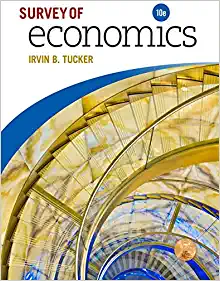Question
Link: (http://freakonomics.com/podcast/should-we-really-behave-like-economists-say-we-do-a-new-freakonomics-radio-podcast/ 1. In this episode, you'll hear Freakonomics Radio producer Greg Rosalsky ) embark on a long and tortuous process to live his life
Link: (http://freakonomics.com/podcast/should-we-really-behave-like-economists-say-we-do-a-new-freakonomics-radio-podcast/
1. In this episode, you'll hear Freakonomics Radio producerGreg Rosalsky)
embark on a long and tortuous process to live his life likehomo economicus.Describe Rosalsky's experiences and behavioral economist Richard Thaler's advice on
- how to get a seat on a subway
- how to play the dating market
- whether to pay for public goods like free music.
2. Rosalsky also ponders whether voting is a rational act. What are the arguments that it is and it isn't?
3. Would it be good or even possible for people to live like economists say they do?
Below is an example of answer . Notice how the student completely answered all parts of the assignment and fully explained herself.
In order to get a subway seat ashomo economicus, Rosalsky attempted to pay other subway riders for their seats. There were few takers and he mostly got dirty looks, not a seat on his subway commute (beyond a nice old lady offering him one for free). His request broke social norms--riders didn't see their seat as "for sale" and his request was met with confusion. Additionally, there seemed to be no price Rosalsky would be able to pay and an able-bodied young man; some riders stated they were only willing to give up their seat for the elderly, sick, or pregnant. Thaler's advice for this situation? "Homo economicuswould bring a fake cane."
Regarding a burgeoning relationship with a potential girlfriend, Thaler encourages Rosalsky to consider the opportunity costs of this possible partner. An "Econ" would compare this girlfriend to all other possible girlfriends, and consider the likelihood of finding someone better. Thaler also brings up the point that in declaring this woman his girlfriend, Rosalsky is unable to consider other alternatives--another opportunity cost of being in a relationship versus being single. That's to say, Thaler does not encourage Rosalsky to behave ashomo economicusin his relationship.
In the portion of the episode about paying for public goods, like free music, Rosalsky speaks with a street musician, Allison, about the public good of the music she creates. She describes the frustration of free-riders that will listen to a few movements of music she is playing, and then walk away without paying. Rosalsky then talks about non-excludable public goods, as well as the free-rider problem.Homo economicusis a proud free rider, according to Thaler, and would think paying street musicians (or donating to charities, etc.) is for schmucks.
On the topic of voting, Rosalsky speaks with Bryan Caplan abouthomo economicus: Caplan says that a super rational Econ might not vote because the odds of a single vote changing an election is so slim, it's not worth it. Non-Econ acquaintances might expecthomo economicusto vote, and thus they are left with the option to take a few hours out of their day to participate in democracy, or perhaps just print out a bunch of "I Voted!" stickers and pretend they cast their ballot. Therefore, voting could be considered irrational--the marginal benefit of voting in an election where your ballot doesn't count is not very high, nor does it outweigh the marginal cost of taking the time to vote. There is also the power of collective, political action and the impact of organizing. Because it is considered a public good,homo economicuswould continue to be a free-rider and benefit from the collective action of their peers. Voting remains irrational until not enough people are voting. Once enough people are no longer participating in voting, your individual vote begins to count more, thus making voting a more rational act. The smaller the pool of voters, the greater the impact of your vote. In this sense, it would be more rational for an individual to vote in smaller, local elections or low-turnout primaries, but irrational to vote in a presidential election.
Not only do I feel the life ofhomo economicusto be immoral, but it would be incredibly lonely. Econs do the right thing to maximize utility, have self-control, and don't fall for the sunk cost fallacy. However,Homo economicusacts out of self interest to maximize their own happiness--an incredibly alienating personality that quickly loses friends, makes it challenging to work with others, and gives little back to the community that they live in. That's to say, I don't think it's quite possible to live ashomo economicusand to follow the rules that economists say drive rational human behavior. Maximizing total utility might include giving something desirable up or doing something intolerable up for loved ones. I also feel likehomo economicusdoesn't make room for the poor, the disenfranchised, or other communities with less power and status. How can individuals consider all the costs and benefits of their decisions when they are limited in their individual freedoms? How can a formerly incarcerated individual make choices that maximize utility when they aren't afforded safe housing and a stable job due to their status as an ex-con? It's been great reading more about behavioral economics, which has begun to provide more nuance and a nod to ethical dilemmas in the field of economics.
Step by Step Solution
There are 3 Steps involved in it
Step: 1

Get Instant Access to Expert-Tailored Solutions
See step-by-step solutions with expert insights and AI powered tools for academic success
Step: 2

Step: 3

Ace Your Homework with AI
Get the answers you need in no time with our AI-driven, step-by-step assistance
Get Started


